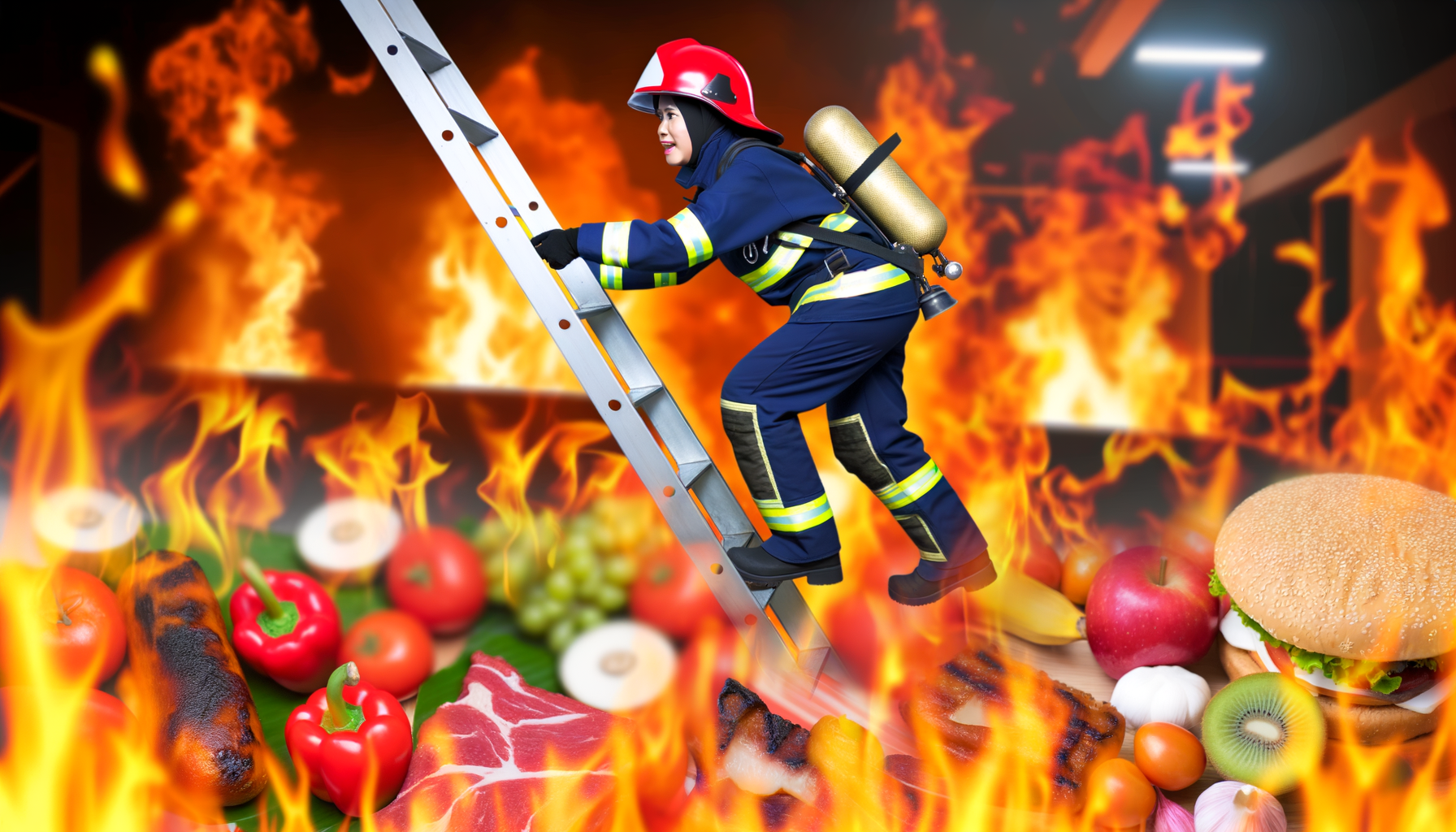Understanding the Caloric Demands of Firefighters and Emergency Responders
Firefighters and emergency responders are among the most physically demanding and high-stress occupations, requiring a unique approach to nutrition to ensure optimal performance and long-term health. The caloric needs of these individuals are significantly higher than those of the general population, and understanding these needs is crucial for maintaining their health and effectiveness on the job.
## The High Energy Expenditure of Firefighters
Firefighters engage in extremely physically demanding activities, especially during emergency responses and training exercises. A study published in the National Center for Biotechnology Information (NCBI) estimated that the total energy expenditure (TEE) of firefighters during large-scale disaster training can range from 3000 to 4000 kcal per day.
This high energy expenditure is comparable to that of professional athletes, highlighting the need for tailored nutritional strategies. For instance, wildland firefighters on tour may require as many as 4400-6000 calories per day to meet their energy needs.
## Nutritional Shortfalls in Firefighter Diets
Despite the high energy demands, many firefighters do not consume adequate calories and essential nutrients. A study comparing the nutrient intake of career firefighters to the Military Dietary Reference Intake (MDRI) found significant deficiencies in several key nutrients, including vitamins D, E, and K, magnesium, potassium, and fiber.
These nutritional shortfalls can have serious implications for the health and performance of firefighters. For example, inadequate vitamin D and magnesium intake can lead to increased risks of cardiovascular events and other chronic conditions.
## Tailoring Nutrition to Job Roles and Activities
The energy requirements of firefighters vary based on their job roles and the specific activities they perform. Research has shown that rescue and other teams tend to consume more energy than fire and Emergency Medical Team (EMS) teams. Additionally, middle-ranking officers tend to expend more energy than higher-ranking officers like Fire Captains.
To address these varying needs, it is essential to develop customized nutritional plans. For instance, a sample 3000-calorie meal plan for a 24-hour shift might include balanced meals and snacks distributed evenly throughout the day to ensure consistent energy levels.
“`html
| Time/Meal | From Home | On The Go |
|---|---|---|
| 5AM – 8AM Breakfast | — 16 oz. black coffee — 4 medium, cooked eggs — 2 slices Dave’s Killer Bread, thin — 1/4 cup Mexican shredded cheese blend — 2 TBSP sriracha hot sauce — 1 banana | — 16 oz. black coffee — 1 Chick-fil-A egg white, grilled English muffin — 1 large Chick-fil-A fruit cup — 1 yogurt parfait |
| 11AM – 1PM Snack | — 3/4 cup non-fat vanilla Greek yogurt — 1 scoop whey protein powder — 1 cup mini wheats — 1 cup grapes — 1 TBSP dark chocolate chips — 1 TBSP chia seeds | — 1 7-Eleven select: hummus pretzels chipotle garlic — 1 serving almonds |
| 1PM – 3PM Lunch | — Buffalo Chicken Wrap (2): – 2 whole wheat wraps – 1/2 cup canned/shredded chicken – 4 TBSP buffalo sauce – TBSP low-fat ranch/bleu cheese – 1/4 red onion – 1 cup coleslaw mix, dry – 1 serving Lays Poppables – 1/3 avocado | — 1 Chick-fil-A grilled market salad — 1 large cup mixed fruit — 1 serving low-fat milk/chocolate milk |
| 6PM – 8PM Dinner | — 2 whole wheat English muffins — 1 cup low-sodium tomato sauce — 1/2 cup part-skim shredded mozzarella — 2 TBSP Marie Calendar’s balsamic vinaigrette — 1/2 cup black olives — 3 cups Dole salad mix — 1 serving ground turkey (93% lean) | — Chipotle Bowl: – 1 order brown rice – 1 order black beans – 1 order chicken – 1 order fajita vegetables – 2 cups lettuce – 1 order cheese – 1 order guacamole |
| 12AM – 3AM Snack | — 1 100-calorie pack Oreo thins — 1 cup blueberries — 2 boiled eggs | — 1 cup popcorn — 2 oz. mixed nuts |
“`
## The Importance of Balanced Nutrition
Balanced nutrition is crucial for firefighters to maintain their physical health, mental well-being, and performance. The International Association of Fire Fighters (IAFF) emphasizes the importance of nutrition through its “Eat for Health,” “Eat for Life,” and “Eat for Real” initiatives. These programs aim to equip firefighters with the knowledge to make healthy dietary choices that support their long-term health and performance.
### Eat for Health
This initiative focuses on making dietary choices that protect long-term health and prevent disease. By using research-based recommendations, firefighters can understand the connection between their dietary choices and their health status, leading to lasting changes.
### Eat for Life
This program acknowledges the physical, emotional, and mental demands of a career in the fire service. It provides information on how quality nutrition practices can support balance at work and home, aiding in training, fitness goals, and recovery both on and off duty.
### Eat for Real
This initiative promotes healthy choices within the unique culture of the fire service. By understanding how food works, firefighters can make informed choices based on their personal preferences and individual goals, leading to long-term success.
## Real-World Examples and Case Studies
Real-world examples highlight the importance of tailored nutrition for firefighters. For instance, during the Great East Japan earthquake in 2011, about half of the fire-fighting personnel showed poor physical condition due to inadequate nutrition and energy intake.
To address these issues, fire departments are now focusing on providing appropriate food and nutrition protocols. For example, the Fire and Disaster Management Agency recommends that each fire department ensure adequate food, water, and personal equipment for at least 72 hours during emergency responses. However, logistical challenges often make it difficult to meet these requirements, emphasizing the need for better planning and resource allocation.
## Conclusion and Next Steps
Firefighters and emergency responders have unique and high caloric needs that must be met to ensure their health, performance, and safety. By understanding these needs and implementing tailored nutritional strategies, fire departments can help reduce the risk of chronic diseases and improve the overall well-being of their members.
For those looking to optimize their nutrition, tools like the Calorie Calculator Cloud can be invaluable in determining specific caloric needs based on activity levels and other factors. Additionally, consulting with performance dietitians can provide personalized fueling plans that cater to individual needs and job roles.
In summary, the nutritional needs of firefighters are complex and demanding. By adopting a balanced and tailored approach to nutrition, firefighters can better manage their health, enhance their performance, and reduce the risks associated with their high-stress occupation.
If you are a firefighter or emergency responder looking to improve your nutritional intake, consider exploring the Calorie Calculator Plans to find a solution that fits your needs. Additionally, resources from organizations like the IAFF and the NCBI can provide valuable insights and guidelines for optimal nutrition.








